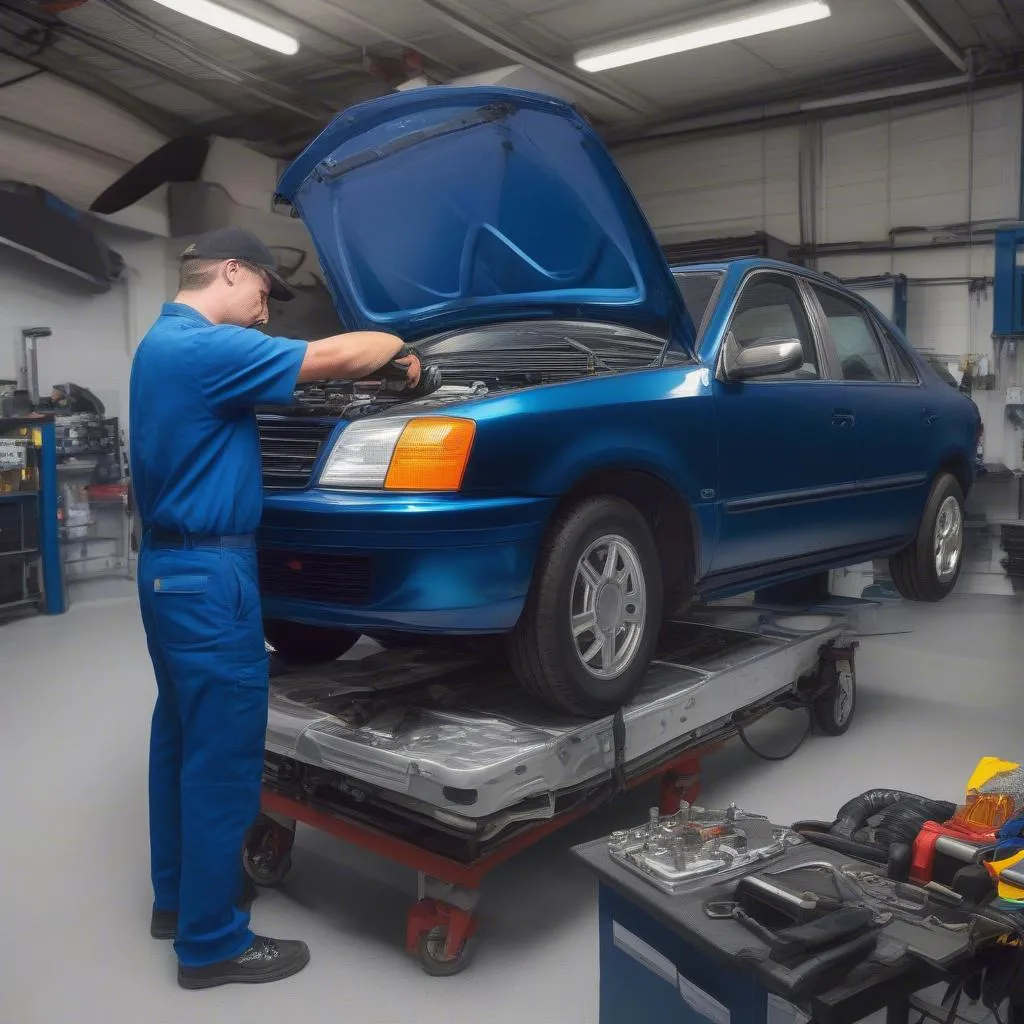“The gas thing on a car.” We’ve all heard it, that vague description that could mean a dozen different parts under the hood. But fear not, fellow motorists! This article dives deep into the mysteries of “the gas thing,” unraveling its various interpretations and equipping you with the knowledge to speak car-talk with confidence.
What Does “The Gas Thing” Even Mean?
Let’s face it, “the gas thing” is about as helpful as a chocolate teapot when you’re trying to diagnose a car problem. It’s like telling a mechanic you have a “weird noise” – they need specifics!
From a mechanic’s perspective, the phrase could refer to anything from the fuel pump to the gas cap. Each component plays a critical role in getting your car from point A to B. Without a clearer picture of the issue, it’s like searching for a needle in a haystack.
Getting Specific: Common “Gas Things” and Their Functions
To truly understand “the gas thing,” we need to break it down. Here’s a look at some common car parts associated with “gas” and what they do:
1. Fuel Cap: Remember that time you drove off with the gas cap dangling? Yeah, that little guy is more important than it seems. It seals the fuel system, maintaining pressure and preventing those harmful fumes from escaping.
2. Fuel Pump: This workhorse lives inside your gas tank, pulling fuel and pushing it to the engine. A failing fuel pump can lead to sputtering, stalling, and a whole lot of frustration.
3. Fuel Filter: Think of this as a gatekeeper, ensuring only clean fuel reaches your engine. A clogged fuel filter can starve your engine, leading to performance issues.
4. Fuel Injectors: These precision components spray a fine mist of fuel into the engine cylinders, where it mixes with air and ignites. Malfunctioning injectors can disrupt this delicate balance, impacting your car’s performance and fuel efficiency.
5. Gas Gauge/Sensor: This dynamic duo keeps you informed about your fuel level. The sensor measures the amount of fuel in the tank, while the gauge displays that information on your dashboard.
6. EVAP System (for those with a modern ride): This complex system captures fuel vapors from the tank, preventing them from polluting the atmosphere.
Real-World Scenarios: “The Gas Thing” in Action
Imagine this: you’re driving down the Pacific Coast Highway in your classic Ford Mustang, the California sun warming your face. Suddenly, your engine sputters and dies. You pull over, scratching your head. “Must be the gas thing,” you mutter. But what “gas thing”? Is it a clogged fuel filter? A failing fuel pump? Without a proper diagnosis, you’re stuck.
Or picture this: you’re late for work in downtown Chicago. You jump into your Toyota Camry, turn the key, and…nothing. You try again, and all you get is a pathetic clicking sound. Your battery is fine. Could it be “the gas thing” again? This time, it might be the fuel injectors, preventing the engine from starting.
These scenarios highlight why it’s crucial to move beyond the ambiguity of “the gas thing.” By understanding the individual components and their functions, you can better communicate with mechanics and get to the root of the problem faster.
Beyond the Basics: Troubleshooting and Diagnosis
Now that you’re familiar with the common culprits behind “the gas thing,” let’s talk about troubleshooting. If you’re experiencing issues, these tips can help you narrow down the possibilities:
- Check Engine Light: This little beacon of warning is your friend. Don’t ignore it! A illuminated Check Engine Light could signal a problem with the fuel system, among other things.
- Performance Issues: Is your car hesitating, sputtering, or stalling? These are telltale signs of a potential fuel system malfunction.
- Fuel Economy: Has your gas mileage suddenly plummeted? This could indicate a problem with fuel delivery or engine performance.
- Fuel Smell: A strong gasoline odor inside or outside the car warrants immediate attention. It could signal a leak in the fuel system.
If you suspect a problem, using a diagnostic tool like a Dealer Scanner For European Cars can help pinpoint the issue. These tools can read your car’s computer, identifying error codes and providing valuable insights for diagnosis.
Seeking Professional Help: When to Call in the Experts
While some “gas things” can be tackled with a bit of DIY spirit, others require the expertise of a qualified mechanic. If you’re experiencing persistent issues, unusual noises, or suspect a serious problem, don’t hesitate to seek professional help. Remember, safety first!
 Mechanic inspecting car engine
Mechanic inspecting car engine
Common Questions about “The Gas Thing”:
Q: My car is hard to start in the morning. Could it be “the gas thing”?
A: Possibly. It could be a sign of a weak fuel pump, a clogged fuel filter, or even a problem with the fuel injectors.
Q: I filled up my tank, but the gauge is still showing empty. Is this a “gas thing”?
A: Yes, this could indicate a problem with the fuel level sensor or the gauge itself.
Q: I hear a hissing sound near the gas tank. What does it mean?
A: A hissing sound could indicate a leak in the fuel system, a problem with the EVAP system, or even a faulty gas cap.
Related Questions and Further Exploration:
Want to delve deeper into the world of car maintenance and diagnostics? Check out these related articles:
- Diagnosing Car Faults: [link to https://diagxcar.com/diagnosing-car-faults/ with text “Learn more about diagnosing common car problems”]
- How to Use a Code Reader: [link to https://diagxcar.com/how-to-use-a-code-reader/ with text “Master the art of using a code reader”]
- DTC Scan Tool Jeep 2016: [link to https://diagxcar.com/dtc-scan-tool-jeep-2016/ with text “Explore diagnostic tools for specific car models”]
Need Expert Help? We’re Here for You!
Diagnosing car problems can be tricky. If you’re struggling to decipher “the gas thing” on your car, don’t worry! Our team of expert automotive technicians is here to help. Contact us on Whatsapp at +84767531508 for assistance with diagnostic tools, troubleshooting, and expert advice. We’re available 24/7 to answer your questions and get you back on the road!
 Car driving on a scenic road
Car driving on a scenic road
Remember, Knowledge is Power!
The next time someone mentions “the gas thing on their car,” you’ll be armed with the knowledge to impress them with your automotive wisdom. And who knows, you might even save the day (and their engine) by deciphering their vague descriptions.


